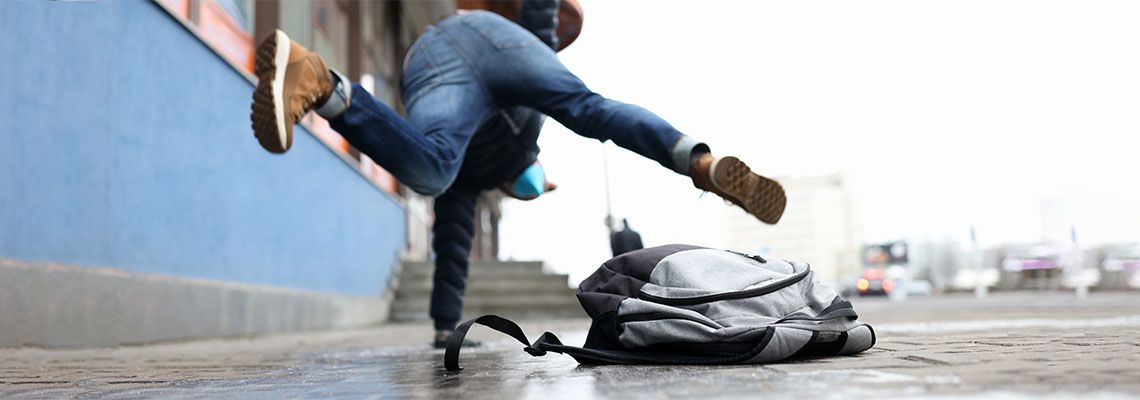
Can I Sue a Business If I Was Hurt on Their Property?
Every day, people leave their homes to run errands. To do this, they need to move in and out of public spaces as well as private businesses. Most of the time, we don’t think twice about these tasks—but what happens if you become injured on a business’s property or public space? And who pays for injuries sustained on public property? Unsafe conditions are all around us and accidents that occur in public spaces or at a business are handled differently than those that occur at a private residence.
For help filing a claim for an injury on public property or learning more about premises liability, call James P. Leahy Attorney At Law. As a premises liability attorney, I’m proud to serve Elgin, Illinois and the surrounding area, including Aurora, St. Charles, and Kane Count.
The Basics of Premises Liability
To understand the criteria for making a personal injury claim, you must first understand premises liability. This legal concept states that the owner of a property can be held responsible for any injuries that occur there. However, there are certain criteria that must be met for a victim to bring a case forward. First, you must be on the property lawfully, meaning you weren’t trespassing and were either invited or on the property to perform a service (such as a handyman).
The property owner’s duty of care is to address any unsafe conditions and ensure any hazards on the property are dealt with. This could mean that the property owner puts up signs to alert a visitor of potential hazards, blocks off an area that could be dangerous, and fixes the unsafe conditions. For example, if someone spilled a gallon of milk at a supermarket, the owner (or manager) would put cones around the spill to let customers know not to walk in the area and then they would clean it up as quickly as possible. Or, if there was a public park that had a broken swing set, they could put fencing around this area and signage telling visitors they were prohibited from using the swing set.
Illinois Business Liability Laws
The state of Illinois also has its own liability laws that work to protect both individuals and business owners. First, to bring a successful claim, you must prove that the business owner had knowledge of the dangerous condition or should have known about the condition and did nothing to address it.
There is also something called the “attractive nuisance” doctrine that puts another layer of responsibility on property owners—but this mainly applies mainly to children who are injured. An example would be a property that had an outdoor swimming pool that would be “attractive” to kids and may entice them to come onto the property illegally. If they were then injured while trying to use the pool, the business owner could be held liable even though the child was technically trespassing. The owner has a duty to mitigate their ”attractive nuisance” and would need to put up fencing to keep children out.
Filing a Personal Injury Claim
Although you can technically file a lawsuit on your own, it’s recommended you work with an experienced personal injury attorney. A skilled lawyer can help you understand how state law supports or weakens your case and can gather evidence and build a case that’s tailored to your specific circumstances.
The first thing you should be aware of is how long you have to file your claim. In Illinois, the statute of limitations is two years after the date the injury occurred. If you fail to meet this filing deadline, then your case will likely be thrown out completely by a judge. Only in rare cases will a judge consider a case submitted after the two years have passed. This typically occurs when the actual injury wasn’t detected until much later or if there were extenuating circumstances that prevented you from filing. Additionally, if you want to bring a lawsuit against a city or county, you have only one year to do this. The best thing you can do to help your case is contact a lawyer as soon as possible so they can ensure all criteria are met and that you stay on top of all deadlines.
Another key concept to understand when filing is comparative negligence. This law states that in injury cases like this, liability can be shared between two parties. Therefore, if you’re seeking damages and the investigation reveals you were partly responsible for the accident occurring, your final payout will be reduced commensurate with your share of blame. For instance, if you were injured at a retail store by slipping on wet floor, but the investigation found you had headphones in and weren't able to hear verbal warnings given to you by an employee, you could hold some liability. If a judge determined you were 40% at fault, then the amount you receive would be reduced by 40%.
Speak With an Experienced Attorney
If you’re in the Elgin, Illinois area and would like to speak with an attorney about a recent injury you sustained while on a business’s property, reach out to James P. Leahy Attorney At Law.